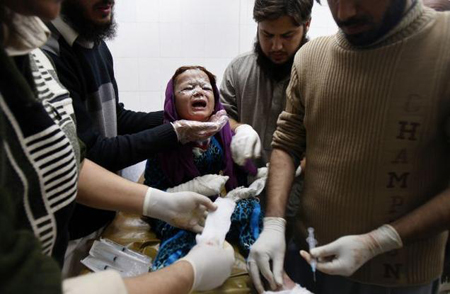The militants attacked the Bacha Khan Airport in Peshawar around 8.30 p.m.
According to local media reports, five rockets were fired by the militants at the airport and two of them hit the runaway.
Five attackers were among the dead and over 40 others were injured, Xinhua reported.
All international and domestic flights were cancelled following the attack.
The attack was in response to a recent military operation in the area, the army said.
The airport authorities said all their assets were safe.
President Asif Ali Zardari and Prime Minister Raja Pervez Ashraf condemned the attack.
Earlier:
Four dead as militants attack Peshawar airport

Islamabad, December 16(Reuters): Four people were killed when militants attacked the airport in the northwestern city of Peshawar on Saturday and traded gunfire with soldiers for more than 30 minutes before being repulsed, military and health officials said.
Pakistan's army rushed reinforcements to the scene of the night attack, one of the most audacious raids by militants since an assault on an air base in the east of the country in August.
A health official said at least 26 people had been wounded at the airport, which handles civilian and military traffic, and that at least three of the dead were militants.
Pakistan's air force said a rocket attack had damaged the outer wall of the air field, which lies near a residential area and military barracks in Peshawar.
"No terrorist has been able to penetrate inside (the air field)," Group Captain Tariq Mahmood, a spokesman for the Pakistan Air Force, said in a statement. "Security forces were fully alert and are in control of the situation."
Mahmood added there had been no casualties among the Pakistan Air Force or damage to equipment during the incident.
Three rockets also hit a nearby residential area, a military official said.
"We have repulsed the attack on the airport, everything is now under control," the military official added.
Hospital staff scrambled to treat wounded brought from the scene of the attack, where residents described hearing gunfire and explosions.
"An emergency has been declared in the hospital and all the surgeons have been called," said Umar Ayub, chief executive of the Khyber Teaching Hospital Peshawar. "All of them suffered bullet injuries and some of the injured are in critical condition."
Peshawar has witnessed many bomb attacks and shootings in recent years, but residents said it was the first time such a large attack had been staged on the airport.
There was no immediate claim of responsibility.
Pakistani militants have staged repeated high-profile attacks on military installations in major cities in recent years in their campaign against the government.






Comments
Add new comment